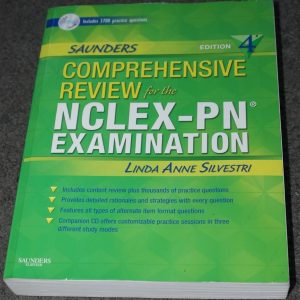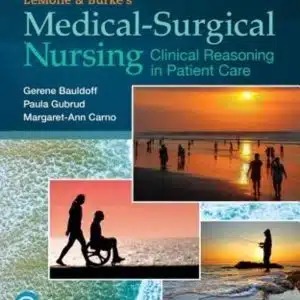Fundamentals of Nursing, 11th Edition by Patricia A. Potter, Patricia A. Stockert Amy Hall Anne Griffin Perry Test bank
Fundamentals of Nursing Test bank
Take Advantage of the limited Time offer
[email protected]
Original price was: $90.00.$40.00Current price is: $40.00.
Fundamentals of Nursing, 11th Edition by Patricia A. Potter, Patricia A. Stockert Amy Hall Anne Griffin Perry Test bank
Table of contact for Fundamentals of Nursing
Chapter 01: Nursing Today
Potter: Fundamentals of Nursing, 11th Edition
MULTIPLE CHOICE
- Which nurse most likely kept records on sanitation techniques and the effects on health?
| a. | Florence Nightingale |
| b. | Mary Nutting |
| c. | Clara Barton |
| d. | Lillian Wald |
ANS: A
Nightingale was the first practicing nurse epidemiologist. Her statistical analyses connected poor sanitation with cholera and dysentery. Mary Nutting, Clara Barton, and Lillian Wald came after Nightingale, each contributing to the nursing profession in her own way. Mary Nutting was instrumental in moving nursing education into universities. Clara Barton founded the American Red Cross. Lillian Wald helped open the Henry Street Settlement.
DIF: Understand (comprehension)
OBJ: Discuss the influence of social, historical, political, and economic changes on nursing practices. TOP: Evaluation MSC: Health Promotion and Maintenance
- The nurse prescribes strategies and alternatives to attain expected outcome. Which standard of nursing practice is the nurse following?
| a. | Assessment |
| b. | Diagnosis |
| c. | Planning |
| d. | Implementation |
ANS: C
In planning, the registered nurse develops a plan that prescribes strategies and alternatives to attain expected outcomes. During assessment, the registered nurse collects comprehensive data pertinent to the patient’s health and/or the situation. In diagnosis, the registered nurse analyzes the assessment data to determine the diagnoses or issues. During implementation, the registered nurse implements (carries out) the identified plan.
DIF: Understand (comprehension)
OBJ: Discuss the development of professional nursing roles. TOP: Planning
MSC: Management of Care
- An experienced medical-surgical nurse chooses to work in obstetrics. Which level of proficiency is the nurse upon initial transition to the obstetrical floor?
| a. | Novice |
| b. | Proficient |
| c. | Competent |
| d. | Advanced beginner |
ANS: A
A beginning nursing student or any nurse entering a situation in which there is no previous level of experience (e.g., an experienced operating room nurse chooses to now practice in home health) is an example of a novice nurse. A proficient nurse perceives a patient’s clinical situation as a whole, is able to assess an entire situation, and can readily transfer knowledge gained from multiple previous experiences to a situation. A competent nurse understands the organization and specific care required by the type of patients (e.g., surgical, oncology, or orthopedic patients). This nurse is a competent practitioner who is able to anticipate nursing care and establish long-range goals. A nurse who has had some level of experience with the situation is an advanced beginner. This experience may only be observational in nature, but the nurse is able to identify meaningful aspects or principles of nursing care.
DIF: Apply (application)
OBJ: Discuss the development of professional nursing roles. TOP: Evaluation
MSC: Management of Care
- A nurse assesses a patient’s fluid status and decides that the patient needs to drink more fluids. The nurse then encourages the patient to drink more fluids. Which concept is the nurse demonstrating?
| a. | Licensure |
| b. | Autonomy |
| c. | Certification |
| d. | Accountability |
ANS: B
Autonomy is an essential element of professional nursing that involves the initiation of independent nursing interventions without medical orders. To obtain licensure in the United States, the RN candidate must pass the NCLEX-RNÒ. Beyond the NCLEX-RNÒ, the nurse may choose to work toward certification in a specific area of nursing practice. Accountability means that you are responsible, professionally and legally, for the type and quality of nursing care provided.
DIF: Apply (application)
OBJ: Discuss the roles and career opportunities for nurses. TOP: Implementation
MSC: Management of Care
- A nurse prepares the budget and policies for an intensive care unit. Which role is the nurse implementing?
| a. | Educator |
| b. | Manager |
| c. | Advocate |
| d. | Caregiver |
ANS: B
A manager coordinates the activities of members of the nursing staff in delivering nursing care and has personnel, policy, and budgetary responsibility for a specific nursing unit or facility. As an educator, you explain concepts and facts about health, describe the reason for routine care activities, demonstrate procedures such as self-care activities, reinforce learning or patient behavior, and evaluate the patient’s progress in learning. As a patient advocate, you protect your patient’s human and legal rights and provide assistance in asserting these rights if the need arises. As a caregiver, you help patients maintain and regain health, manage disease and symptoms, and attain a maximal level function and independence through the healing process.
DIF: Apply (application)
OBJ: Discuss the roles and career opportunities for nurses. TOP: Implementation
MSC: Management of Care
- The nurse has been working in the clinical setting for several years as an advanced practice nurse. However, the nurse has a strong desire to pursue research and theory development. To fulfill this desire, which program should the nurse attend?
| a. | Doctor of Nursing Science degree (DNSc) |
| b. | Doctor of Philosophy degree (PhD) |
| c. | Doctor of Nursing Practice degree (DNP) |
| d. | Doctor in the Science of Nursing degree (DSN) |
ANS: B
Some doctoral programs prepare nurses for more rigorous research and theory development and award the research-oriented Doctor of Philosophy (PhD) in nursing. Professional doctoral programs in nursing (DSN or DNSc) prepare graduates to apply research findings to clinical nursing. The DNP is a practice doctorate that prepares advanced practice nurses such as nurse practitioners.
DIF: Understand (comprehension)
OBJ: Compare and contrast the educational programs available for professional registered nurse (RN) education. TOP: Teaching/Learning MSC: Management of Care
- A nurse attends a workshop on current nursing issues provided by the American Nurses Association. Which type of education did the nurse receive?
| a. | Graduate education |
| b. | Inservice education |
| c. | Continuing education |
| d. | Registered nurse education |
ANS: C
Continuing education involves formal, organized educational programs offered by universities, hospitals, state nurses associations, professional nursing organizations, and educational and health care institutions. After obtaining a baccalaureate degree in nursing, you can pursue graduate education leading to a master’s or doctoral degree in any number of graduate fields, including nursing. Inservice education programs are instruction or training provided by a health care facility or institution. Registered nurse education is the education preparation for an individual intending to be an RN.
DIF: Apply (application)
OBJ: Compare and contrast the educational programs available for professional registered nurse (RN) education. TOP: Teaching/Learning MSC: Management of Care
- A nurse identifies gaps between local and best practices. Which Quality and Safety Education for Nurses (QSEN) competency is the nurse demonstrating?
| a. | Safety |
| b. | Patient-centered care |
| c. | Quality improvement |
| d. | Teamwork and collaboration |
ANS: C
Quality improvement identifies gaps between local and best practices. Safety minimizes risk of harm to patients and providers through both system effectiveness and individual performance. Patient-centered care recognizes the patient or designee as the source of control and full partner in providing compassionate and coordinated care based on respect for patient’s preferences, values, and needs. Teamwork and collaboration allows effective functioning within nursing and interprofessional teams, fostering open communication, mutual respect, and shared decision making.
DIF: Understand (comprehension)
OBJ: Discuss the roles and career opportunities for nurses. TOP: Evaluation
MSC: Management of Care
- A nurse has compassion fatigue. What is the nurse experiencing?
| a. | Lateral violence and intrapersonal conflict |
| b. | Burnout and secondary traumatic stress |
| c. | Short-term grief and single stressor |
| d. | Physical and mental exhaustion |
ANS: B
Compassion fatigue is a term used to describe a state of burnout and secondary traumatic stress. Compassion fatigue may contribute to what is described as lateral violence (nurse-nurse interactions, not intrapersonal). Frequent, intense, or prolonged exposure to grief and loss places nurses at risk for developing compassion fatigue. Stressors, not a single stressor, contribute to compassion fatigue. Physical and mental exhaustion describes burnout only.
DIF: Understand (comprehension)
OBJ: Discuss the influence of social, historical, political, and economic changes on nursing practices. TOP: Assessment MSC: Health Promotion and Maintenance
- A patient is scheduled for surgery. When getting ready to obtain the informed consent, the patient tells the nurse, “I have no idea what is going to happen. I couldn’t ask any questions.” The nurse does not allow the patient to sign the permit and notifies the health care provider of the situation. Which role is the nurse displaying?
| a. | Manager |
| b. | Patient educator |
| c. | Patient advocate |
| d. | Clinical nurse specialist |
ANS: C
Fundamentals of Nursing, 11th Edition by Patricia A. Potter, Patricia A. Stockert Amy Hall Anne Griffin Perry Test bank
Order Fundamentals of Nursing on
and Here by Email
User Reviews
Be the first to review “Fundamentals of Nursing, 11th Edition by Patricia A. Potter, Patricia A. Stockert Amy Hall Anne Griffin Perry Test bank”

Original price was: $90.00.$40.00Current price is: $40.00.










There are no reviews yet.